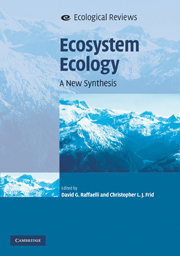Book contents
- Frontmatter
- Contents
- List of contributors
- Preface
- 1 The evolution of ecosystem ecology
- 2 Linking population, community and ecosystem ecology within mainstream ecology
- 3 Thermodynamic approaches to ecosystem behaviour: fundamental principles with case studies from forest succession and management
- 4 Ecosystem health
- 5 Interdisciplinarity in ecosystems research: developing social robustness in environmental science
- 6 The links between biodiversity, ecosystem services and human well-being
- 7 Ecosystem ecology and environmental management
- Index
Preface
Published online by Cambridge University Press: 05 June 2012
- Frontmatter
- Contents
- List of contributors
- Preface
- 1 The evolution of ecosystem ecology
- 2 Linking population, community and ecosystem ecology within mainstream ecology
- 3 Thermodynamic approaches to ecosystem behaviour: fundamental principles with case studies from forest succession and management
- 4 Ecosystem health
- 5 Interdisciplinarity in ecosystems research: developing social robustness in environmental science
- 6 The links between biodiversity, ecosystem services and human well-being
- 7 Ecosystem ecology and environmental management
- Index
Summary
What can ecological science contribute to the sustainable management and conservation of the natural systems that underpin human well-being? This is a question that is taxing many professional ecologists, learned societies and science funders. The question has been driven by both the increased awareness of the present ecological crisis and the publication of several documents influential at the highest political level, such as the Intergovernmental Panel on Climate Change (IPCC) reports, the Stern Review, GEO4 and, most relevant to the present volume, the Millennium Ecosystem Assessment. The impetus and stimulation for this volume came in part from workshops hosted by UK Pop Net and the British Ecological Society (BES) in 2003 and 2007, respectively, which aimed to seek an answer to the question: how can mainstream ecology, and by definition the ecologists within learned societies like the BES, contribute to national and international initiatives aimed at implementing a holistic ecosystem approach for environmental management? That workshop revealed a huge potential within the community but also frustrations about, and ignorance of, the different perspectives on ecosystem ecology held by the different sectors within mainstream ecology: reductionist versus holistic approaches, inter-disciplinary versus mono-disciplinary approaches, those which recognise humans as part of versus apart from the ecosystem.
Ecosystem Ecology implies both a different perspective and a different approach to the science. The more holistic view tends to regard the ecosystem as rich in ecological linkages, some of which may be strong but many of which will be individually weak.
- Type
- Chapter
- Information
- Ecosystem EcologyA New Synthesis, pp. vii - xPublisher: Cambridge University PressPrint publication year: 2010

